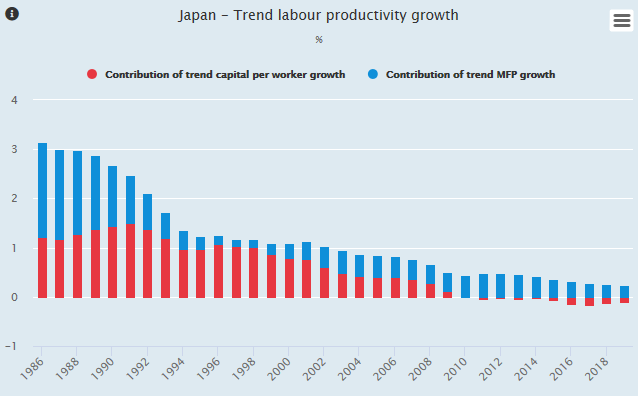Productivity Profile of Japan
 Organisations
Organisations
Council of New Form of Capitalism Realization (CNFCR): The CNFCR is an advisory council to Prime Minister that was founded in October 2021. Prime Minister is the chair of the Council, which consists of six ministers and sixteen private-sector experts (two academic experts and fourteen business persons). The Council does not have an English website, but its meetings are reported on the Prime Minister’s website.
Council on Economic and Fiscal Policy (CEFP): The CEFP is a statutory advisory body to the Prime Minister on economic and fiscal policy management that was founded in January 2001. The Prime Minister is the chair of the Council, which consists of five ministers, the governor of the Bank of Japan and four private-sector experts (two from academia and two from the business sector). The Council drafts the Cabinet’s annual Basic Policy on Economic and Fiscal Management and Reform, which articulates priorities of budget, tax and structural reforms of the year.
Council for Promotion of Regulatory Reform (CPRR): The Council is a statutory advisory body to the Prime Minister that was established in October 2019 as a permanent body, succeeding the role of the predecessor councils that were installed by temporary cabinet orders in every three years. The CPRR consists of 9 members from the business sector, academia and research institutes. Its mandate is to review and deliver an annual report on recommendations of regulatory reforms, which is to be endorsed as a cabinet decision that binds all relevant government agencies.
 Selected Publications
Selected Publications
OECD: Economic Surveys Japan (multiple), Creating Responsive Adult Learning Opportunities in Japan (2021), Structural adjustment and changes to employment use in Japan (2020), Labour market reform in Japan to cope with a shrinking and ageing population (2019);
Cabinet Office: Annual Report on the Japanese Economy and Public Finance (multiple), Comprehensive Economic Measures to Secure People’s Lives and Livelihoods towards Relief and Hope (2020), Emergency Economic Measures to Cope with COVID-19 (2020);
Cabinet Secretariat: Grand Design and Action Plan for a New Form of Capitalism (2022), Action Plan of the Growth Strategy (2021);
ESRI Discussion Paper Series: Identification and Estimation of Production Function with Unobserved Heterogeneity (2022), The impact of data management and organizational structure on AI utilization: Empirical analysis using JP-MOPS data (2021), How does innovation derive from the effective use of data and management skills? Evidence from JP-MOPS data for the Japanese wholesale sector (2020), Management practices meet labour market outcomes (2019).
RIETI Discussion Paper Series: What Do R&D Spillovers from Universities and Firms Contribute to Productivity? Plant level productivity and technological and geographic proximity in Japan (2022), Does Industry Agglomeration Attract Productive Firms? The role of product markets in adverse selection (2022), The Effect of Uncertainty on Entrepreneurial Activity (2022), Productivity Dynamics of Work from Home since the Onset of the COVID-19 Pandemic: Evidence from a panel of firm surveys (2022), Enhancing Team Productivity through Shorter Working Hours: Evidence from the Great Recession (2021)
 Data
Data
Click here to access our Compare-Your-Country tool and explore productivity data from the GFP member countries.

 Latest OECD Recommendations
Latest OECD Recommendations
- Increase targeted spending on R&D, investment and education and training to boost productivity growth.
- Encourage mergers, acquisitions and divestitures of SMEs in the face of labour shortages to promote consolidation of managerial resources in viable firms.
- Expand access to entrepreneurial training and finance, in particular for women.
- Increase the wealth exemption from personal bankruptcy to promote exit and entry.
- Continue Work Style reforms including equal pay for equal work and flexible working arrangements with improving child-care provision.
- Enhance job-training schemes, especially for the low-skilled and those with limited access to firm-based training.
Related Documents


